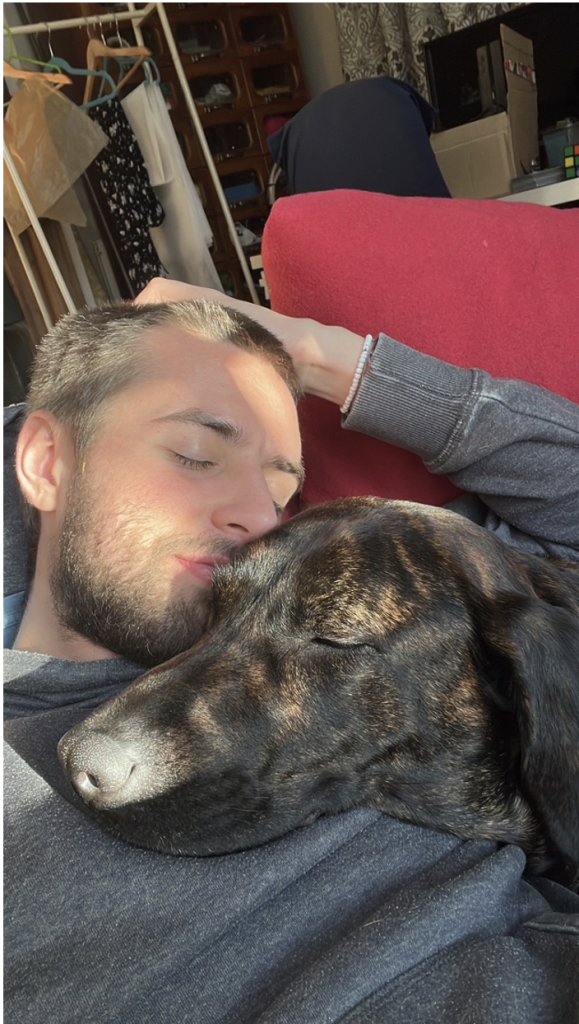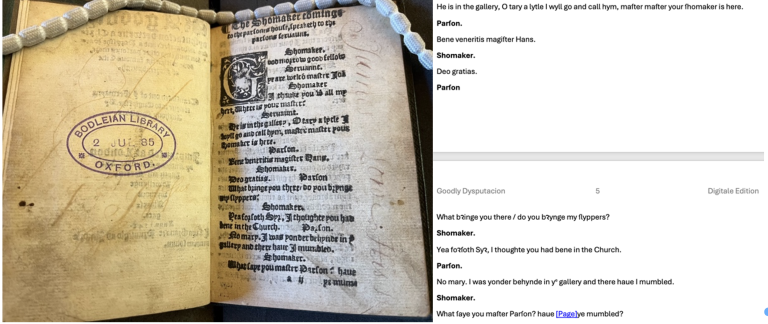David Hirsch studies Translation Studies at Heidelberg University and spent his mandatory placement in Oxford during Hilary Term 2024, working with Henrike Lähnemann
I was very nervous arriving in Oxford, as I had never had an experience quite like this before. It was quite beneficial to me, then, to be instantly thrown in the deep end and start getting into the material. Of course I had a vague idea of what I would be doing during my time here, but much was still unclear and I was excited to find out more about how my next two months would look like. As a German student in (modern!) translation science, I was curious to find out how my skills would hold up against early modern German and English texts, of which I knew next to nothing.
The first two weeks were filled with new experiences and acquaintances. For instance, I had the chance to attend a formal dinner at St Edmund Hall and Burns Night festivities. I did lots of exploring Oxford, visited different college chapels for evensong and concerts and met many interesting people. I also explored a lot of nature around Oxford with my dog Mia.
I also quickly figured out the nature of my day to day as an intern. During the week, I attended a variety of different courses together with other students, in which I gained insights into pre-modern German. I was especially fascinated by the hands-on approach to the seminars. Original editions were brought to class, a letterpress workshop was visited where we got to experience the printing process first hand. This experience was especially valuable, because the technical knowledge it provided was directly applicable to other tasks during my stay.
The main part of my work here was participating in preparing an edition of Hans Sachs‘ reformation pamphlets. I worked with the Disputation zwischen einem Chorherrn und Schuhmacher, of which I initially understood very little. But as I started to transcribe an early 1548 English translation of this pamphlet (one of my first tasks, which I quite enjoyed) and the courses and seminars went on, my understanding of the text and how to deal with these medieval language variations quickly deepened.It was, at first, very challenging to be working so independently, but I soon started to see the benefits and enjoyed making my own editorial decisions. Additionally, whenever I didn’t know how to proceed or needed any kind of advice, Henrike Lähnemann was always available and very helpful.
A second big part of my work here was to encode a digital edition of the aforementioned English translation. For this purpose, I attended a digital editions workshop with Emma Huber at the Weston library, where I learned the very first things about encoding, since I had always avoided „technical computery things“ and had a sort of frightful respect of them. I was surprised to see the encoding come quite naturally and managed to produce an encoding, of which a first draft can already be admired: https://editions.mml.ox.ac.uk/editions/shoemaker/#
There were also many different other tasks for me from time to time. I had the chance to correct translations the other students made for the seminar, which was very interesting since this is a part of the academic world that I, as a student, am generally unfamiliar with, and also challenging, since my early modern German skills were only weeks old. With some of the students I met outside of class to go over their translations or, for those planning a year abroad, to tell them a bit about Germany and the university system there. I also had the privilege of attending and helping out at the Annual Johannes Lähnemann Interfaith Education and Peacebuilding Lecture.

Over the course of my time here, I gained lots of insights into academic work and life, one of the main reasons why I decided to come to Oxford. I could also see the student life from a completely new point of view, since the experience is, from the seminar room through social gatherings to the accommodation, nothing like anything I am used to. I had many interesting conversations with equally interesting people and got a glimpse into a very unique cultural bubble. I’m very grateful to Henrike for giving me the opportunity to come here and experience this one-of-a-kind city in all its facets. Now I’m looking forward to spend another two weeks in different parts of the island before embarking on the journey home.
